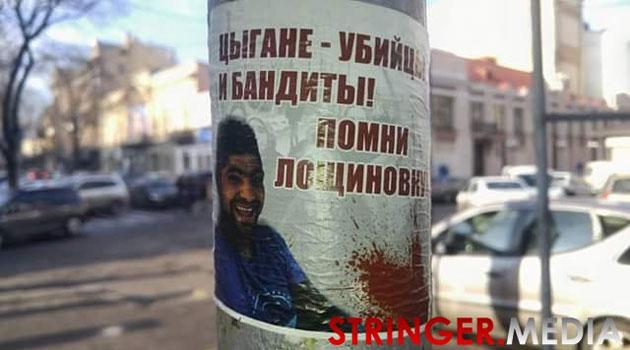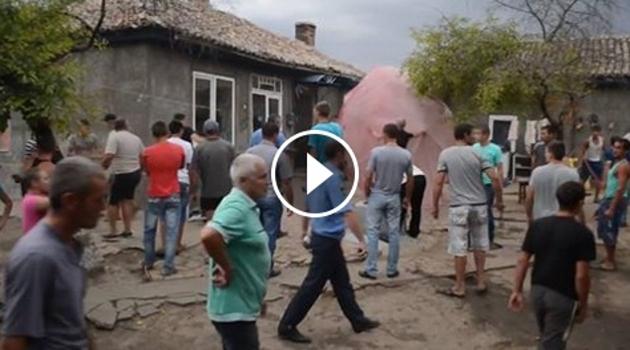Squares and streets in the Ukrainian city of Odessa have recently been flooded with posters featuring portraits of Romani people splattered with blood and messages such as “Roma are bandits and murderers!” Other posters read “Don’t forget Loshchynivka”, a reference to a case in which a girl from that village was murdered in August 2016, sparking pogroms against local Romani residents.
A 20-year-old man from the Romani community is suspected in that murder and is in custody awaiting trial. Police officers in Odessa are now gradually removing the posters, which are an indirect call for the anti-Romani pogroms to be revived, but more and more keep appearing in the streets.
It is not yet clear who the author of the posters is. The fact that there are hundreds of them, and the rapidity with which they are appearing in the streets, is proof, according to local media, that they are the work of a numerous, organized group of people.
Some local media speculate that the fact that thousands of members of the Right Sector and other radical ultra-right movements have recently moved into Odessa and its environs, where they have been given land by the Ukrainian state on which to build their own homes as a reward for fighting against the separatists in Donetsk and Luhansk in the east of the country, is the reason for the campaign now underway in Odessa. The Ukrainian news server antifashist.com estimates the number of such newcomers at more than 3 500 and has written that the only thing they have in common, besides their ultranationalist opinions, is that they have no relationship whatsoever to the Odessa region: “These are mostly newcomers from the impoverished Western areas of Ukraine who want to live by the sea and near the center of Odessa. They are convinced that they deserve to because of their participation during the war.”
All of the former soldiers are still armed, and in the places where more of them live together they frequently abuse that fact to extort and rob local inhabitants and take the law into their own hands, such as in the village of Loshchynivka where the girl was murdered in August and where the ultranationalists appear from time to time in off-road vehicles. The armed radicals, who dismantled a statue of Lenin in the village a couple of days prior to the girl’s murder, have also threatened local Romani people there.
Anti-Romani sentiment in Odessa and its environs became exacerbated after the 20-year-old Romani neighbor of the nine-year-old girl was charged with her murder and turned out to already have a prison record. The girl’s dismembered corpse was found with multiple lacerations and stab wounds on 27 August 2016 in an abandoned building on the outskirts of the village.
Immediately after the Romani man was arrested on suspicion of committing the murder, approximately 300 local non-Romani men set out for the Romani section of the village, tore down the fencing around the Romani residents’ homes, smashed their furniture and windows, and did their best to set the buildings on fire. Police called to the scene were incapable of preventing the homes from being looted.
Most of the Romani residents managed to escape at the last minute with their bare lives, leaving all of their belongings behind, and those who had been driven away from homes to which they properly hold legal title then sent letters of protest to Ukrainian Interior Minister Arsen Avakov and the chair of the Ukrainian Parliament, Valerie Lukovska, objecting to the fact that they had been unjustly expelled according to the principle of collective blame. The Organization for Security and Cooperation in Europe (OSCE) also appealed to the Ukrainian MP, who called on Ukrainian President Poroshenko and the Supreme Council of Ukraine to halt the illegal displacements of ethnic minorities.
The Roma who have been displaced from Loshchynivka are still afraid to return to their homes because the situation in the village is still tense. Some have at least managed to briefly visit the village, accompanied by special forces units, to remove whatever property remained in their homes after the pogroms.

